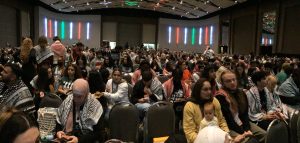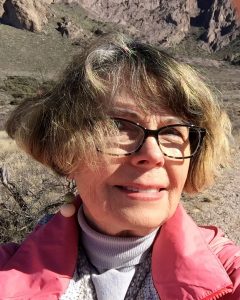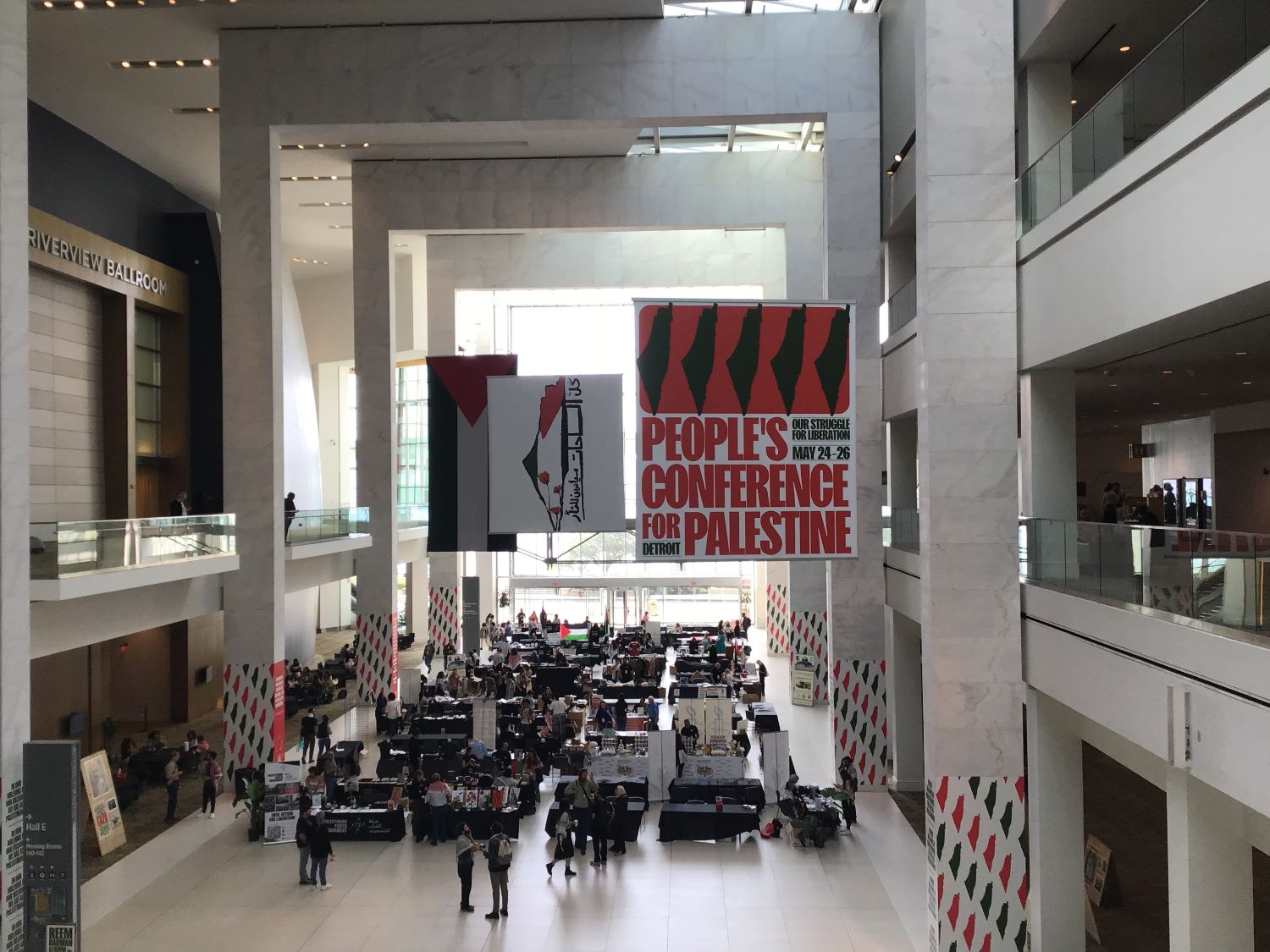On the last weekend this past May, the People’s Conference for Palestine: Our Struggle for Liberation was held at Huntington Place in Detroit. Convened by fifteen organizations, the conference drew over 3,500 participants with thousands of others joining online.

Given the current political climate in which Israeli historian, and director of the Exeter University’s European Centre for Palestine Studies in the U.K., Ilan Pappe had been recently detained at Detroit Metro airport and questioned by federal agents for two hours, I felt occasional flutters of anxiety about security at the event and what kind of disruptions we could expect. However, there was no need for concern; The event was well-organized, the passion and love I felt throughout the event was palpable, and the conference unfolded smoothly.
I went in eager to hear the remarks of the Palestinian-British reconstructive surgeon, Dr. Ghassan Abu Sittah, who spoke to us via the internet and stated that he has not been allowed into the U.S. for the past seven years. He had first hand experiences with Doctors Without Borders earlier in the assault, now in its eleventh month, treating victims in Gaza and witnessing the horrific injuries caused by the use of white phosphorus and 2,000 pound bombs that can level a city block. His message contradicts dominant narratives. He has also not been welcome in Europe. This spring, he was not permitted to enter Germany to speak at a conference that was broken up by police within minutes for no apparent reason and was also not allowed to enter France, where he had been invited to speak to the French Senate. I found his humanity deeply moving and his insight into what he calls the genocidal project, chilling. I also looked forward to hearing from renowned physician, politician, and activist, Moustafa Barghouti whose calming presence, maturity, and wisdom were reassuring and grounding.
The conference was filled with high energy and remarkable clarity. I did not sense hatred. At all times, the distinction was made between Zionism as a political ideology, Israel as a settler colonial project like the U.S., and the Jewish people as religious, cultural, and ethnic communities. Many myths were named and addressed: This one stood out: No, Palestinians do not hate Jewish people. What is detested is living under occupation and apartheid, being violently driven from one’s village and ancestral lands without the right of return, and being held indefinitely in a concentration camp under abusive conditions. This cruel and abusive treatment flies in the face of the desire we all share to belong and to be treated with respect and dignity.
Apartheid and occupation have been tacitly supported by the U.S. and other NATO countries for decades. Now we witness nearly unconditional support for a brutal ethnic cleansing and war against children, happening in front of our eyes. Weapons shipments continue to flow, and the horrors on the ground intensity: waste water plants destroyed, families being displaced over and over, access to clean water, food, sanitation, and medicines, reports of sexual violence in dungeons. The polio virus has been detected in sewage. It is a ghoulish festival of destruction. Now the violence is spreading to neighboring countries with assassinations of key Hamas and Hezbollah leaders.
Throughout the conference, presentations included confronting Zionism and imperialism, the excitement generated by the student uprising on university campuses, and building power, uncommitted votes and the fracturing of the two-party system, the role of the corporate media in promoting a narrative that dehumanizes the Palestinian people, and an international panel that included the historical example of Korea and the Philippines on the receiving end of U.S. aggression and militarism.
On day two of the conference, the much anticipated arrival of keynote speaker, journalist, and activist, Sana’ Daqqa and her four-year-old daughter, Milad, was delayed. However, once they arrived, they were encircled in a flash mob of love by participants who walked with them to the stage. Sana’ was married to novelist Walid Daqqa, a Palestinian citizen of Israel who had been held in an Israeli prison for 38 years after being convicted of commanding a group committed to the liberation of Palestine. He died this spring of complications from cancer. The family learned of his death via social media. Israeli police forcefully dispersed those who came to his funeral. Sana’ is currently leading a campaign to release his body. Milad was conceived by an act of resistance known as sperm smuggling. We were told that around 100 children have been conceived through this practice.
Two gentlemen I was chatting with before a session asked me why I came to the conference. I said I wanted to show up in this moment as well as gain a better understanding. I said I hoped people would show up for me if the situation were reversed. Given the global challenges we face, an unprecedented level of solidarity and cooperation will be needed. The self-interest and hubris of the nation state blocks this, the reluctance of many of us to question what we are told supports this.
People are working on many fronts with a variety of tactics. Voting uncommitted in the U.S. election primaries made a bold statement, helped shift public opinion, and acknowledged the complicity of the government and the mainstream/corporate media. In addition, for years, there have been efforts and some successes to “Block the Boat,” a grassroots effort to disrupt arms shipments to Israel. The Palestinian Youth Movement, for example, is focusing on pressuring the Danish shipping giant, Maersk, to cut ties with Israel
There was an effort to explain the need for armed resistance. There was also enthusiasm for the David and Goliath-like story of Yemen’s Houthi rebel’s success in disrupting shipping through the Red Sea as an act of solidarity.
I walked away with a better sense of the beauty and power of Palestinian cultural and community life. The program included evocative music, chants, and songs in Arabic and a boundless enthusiasm for life. A woman sitting up front at the plenaries would stand up and dance exuberantly from time to time. I learned how samud or steadfastness is a core practice of Palestinian culture. This moral courage and determination is profound: we see videos of doctors risking their own lives to show up day after day in the wreckage of the hospitals, people caring for the bodies of the martyrs, the smiles and the suffering of the children.
Palestinian people are, unapologetically, determined to get their land back. (Just as the Indigenous peoples of Turtle Island want what was taken from them returned.) And, if this sounds unreasonable to you, just think about how you feel when someone steals something as trivial as your lunch from the work fridge, or perhaps your wallet from your purse. Now, imagine you’ve been violently forced from your home, the family farm handed down by your grandparents, and your entire neighborhood or town demolished and renamed. How would you respond?
The similarities between Israel, the United States, and other settler colonial projects are striking. More and more as the voices of those who have long been oppressed and suppressed are given attention credence and equal air-time, Only recently, am I starting to understand the extreme level of extreme and systemic violence, manipulation, and dehumanization that is required to maintain systems of domination. And that is why further complicity with such systems must not continue to be our default way of life.
In the final hours of the conference, there was news that tents of displaced people in Rafah in a supposed safe zone had been bombed. The effect of the news was palpable. The closing statement included these words: “This is not a humanitarian crisis. This is a genocidal war against a colonized people to stifle and break our spirit. This is a war against humanity itself.”
Over $200,000 was raised at the event to be sent to the Middle East Children’s Alliance to support the people of Gaza.
The agony of bearing witness to a live-streamed genocide grinds on in its tenth month. Many Jewish organizations and individuals in North America and beyond have been doing courageous emotional and spiritual labor in speaking out, at a personal cost, on behalf of our shared humanity. They are helping to shift the narrative that robs Palestinian people of theirs.
Gaza is a ghoulish festival of death, misery, and destruction, a war against children and a war against life. Armed drones whir through the air day and night. In late April, $17 billion more unconditional military aid was approved by Congress with pressure from the administration. In signing the bill, the president called it a “good day for world peace.” As recently as May 20, President Biden asserted: “Let me be clear. This is not a genocide.” Israeli hostage families feel betrayed by their government’s failure to negotiate the release of their loved ones.. How can any of this be right? Meanwhile, the Palestinian people find a way to show up every day and carry on. This is what a healthy culture does in a profoundly unhealthy world.
The United States is the #1 funder of the ethnic cleansing of Gaza, providing bombs, fighter jets, artillery shells, and political cover. It is painful to watch public officials defend their positions. The narrative is amplified by corporate, mainstream media, and yet it is shifting.
I find myself in a state of grief and outrage that my tax dollars are being used for this unprecedented level of lethality and destruction, including AI programs “Lavendar” and “Where’s Daddy.” Let’s do the work to build a world where all children are understood to be precious and worthy of protection and care. One human family. One circle of life.
“Gaza is the moral compass of our world,” – Munther Isaac
From Simon Wolff
I think what struck me the most was the power of being in a Palestinian led and centered space. And how the spirit of samud was so palpable. It was an honor to be in that space as an accomplice. –Simon Wolff (they/he), politicized healer, ritualist, and artist
From Jesse Deer In Water
I could really feel the sacred and righteous rage of the people. After all, it intersects with what happened to my Cherokee people here on Turtle Island. I came away with a deeper understanding of the history hearing directly from the experience of Palestinians. I also got to talk with members of the International Jewish Anti-Zionist Network which was also very insightful. I have a clearer picture of what I need to do in the belly of the beast. We play a key role here in dismantling the structures that destroy the beauty in the world.
Jesse Deer In Water, a citizen of the Cherokee Nation of Oklahoma, organizer for Citizens’ Resistance At Fermi Two (CRAFT)
From James W. Perkinson
I could really feel the sacred and righteous rage of the people. After all, it intersects with what happened to my Cherokee people here on Turtle Island. I came away with a deeper understanding of the history hearing directly from the experience of Palestinians. I also got to talk with members of the International Jewish Anti-Zionist Network which was also very insightful. I have a clearer picture of what I need to do in the belly of the beast. We play a key role here in dismantling the structures that destroy the beauty in the world. –Jesse Deer In Water, citizen of the Cherokee Nation of Oklahoma, an organizer for Citizens’ Resistance At Fermi Two (CRAFT)
Hesitant, my mate and I decide to go ahead and jump into the big gathering on Palestine in the former Cobo Hall and are astonished that 3,500 others are similarly-minded! Three days later, we come out roused and encouraged at the resilience, the depth, the rage, and the refusal to be contained by a name or a policy or the impossibility of taking on an empire! Folk given voice here—like folk in Detroit over generations—proud, magnificent, unbowed, and uncowed, registering their beauty and ferocity no matter the bombs and blockage!
This is now a litmus test for a country—indeed, a planet! Sudan. Congo. Haiti. Burma. Ukraine.
Palestine. How now breathe? –James W. Perkinson, Seminary professor, activist, and poet
~ Watch the recorded plenary sessions from the People’s Conference For Palestine here: bit.ly/pcforp

Rev. Deb Hansen. Deb was a board member of Michigan Interfaith Power & Light. She worked for many years in corporate America before becoming a refugee of modern culture. She served as a chaplain at Sinai-Grace Hospital and is currently a spiritual director, water and climate protector, and advocate for healing and repairing our relationships with the larger kin-dom and with one another. She’s endlessly fascinated by the process of cultural transformation that allows human life to renew itself.


